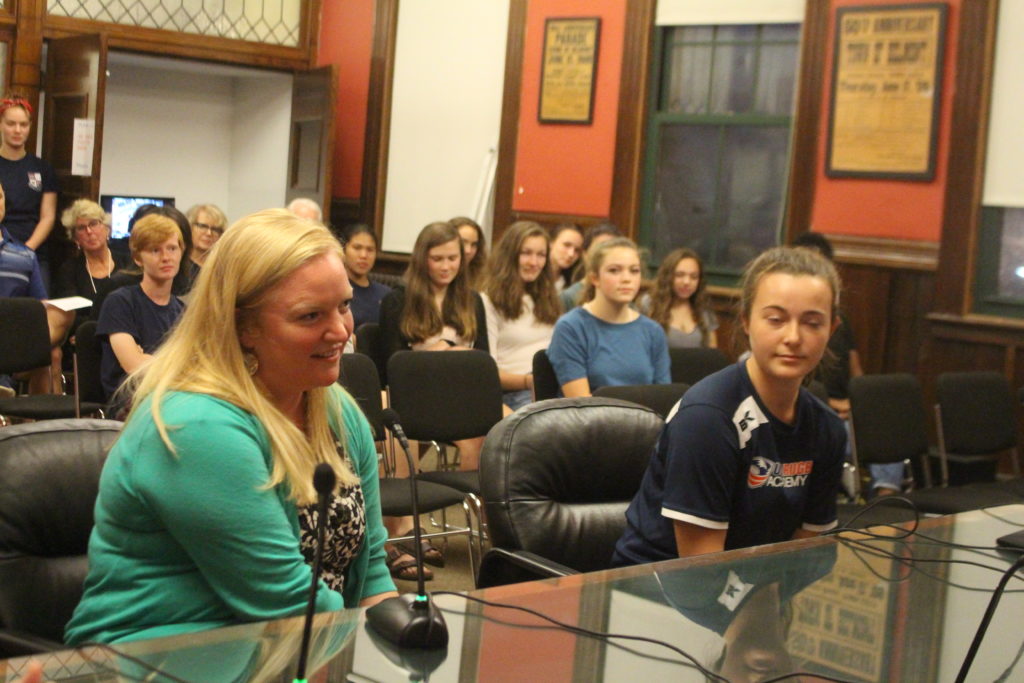Photo: The web page of the Attorney General’s Open Meeting Law web page.
The Concord Avenue resident who fired a shot across the Planning Board’s bow a month ago concerning possible violations of the state’s Open Meeting Law is now training his aim at the board’s waterline after submitting his complaint to the Commonwealth late last month.
Tim Duncan filed his 40-page accusation with the Office of the Attorney General on Sept. 29 relative to the meetings of “working groups” in connection with the Belmont Day School project which the Planning Board OKd a site and design plan in September.
(A copy of the filing can be obtained through the Belmont Town Clerk’s office, and its new Public Records Request web page.)
“The Attorney General’s office has an enormous amount of experience in dealing with open government and meeting law issues,” Duncan told the Belmontonian last week. “I am confident that they will consider the facts, make a wise decision and determine an appropriate remedy,” said Duncan.
Duncan filed his complaint initially with the Town’s Clerk in August alleging the Board employed small “working groups” to supersede critical discussion on issues including landscaping, parking and a proposed “driveway” that he believed should have been held during the public hearing process. Also, he said there were no minutes to the meetings which is contrary to the public’s “need to know” as part of the Open Meeting Law.
In response to his earlier complaint filed with the Town Clerk’s Office, Belmont Town Counsel George Hall believes the Planning Board was within its legal right to have working groups take up specific technical issues that helped move on the review process. The Planning Board will briefly discuss the Open Meeting challenge at its Oct. 17 meeting.
For Duncan, who would live across Concord Avenue from the highly controversial “driveway” which will allow a second entry to the school, the board’s systemic violation of the law to ensure transparency in the deliberations on which public policy is based, requires state action.
“I don’t think there is any doubt that the current structure, process, and role of the Planning Board in Belmont is dysfunctional and needs to be changed,” said Duncan.
A week after filing his complaint, a citizens’ petition was submitted by three residents as an article in the Special Town Meeting Warrant which would change the Planning Board from an appointed to an elected body. Campaigners noted alleged violations of the Open Meeting process and abuses by a former board as their reason for the change.
Duncan decided to file his complaint with the Attorney General when it appeared to him that no movement was forthcoming by the town to answer his allegations.
“When I filed the original complaint on Aug. 11, the Attorney General’s office strongly suggested that the town initiate a dialogue with me and others in the community to address the issues that were identified,” said Duncan.
“The town made no effort to contact me, and the Planning Board hired town counsel [George Hall] to respond to the complaint without allowing any public comment or discussion whatsoever. Likewise, I have heard nothing from the town about my more recent filing,” he said.
“My guess is that the town is once again going to waste a significant amount of Belmont residents’ money on legal fees to have town counsel prepare a response, vote on it without public input instead of addressing the problems that need to be addressed,” said Duncan.
Duncan said he did not move recklessly in submitting his allegations to the state.
“Before filing the complaint with the AG’s office, I spent quite a bit of time reviewing dozens of emails and documents I received relative to the Planning Board’s process, discussing the issues with a significant number of people and thinking about the next steps,” he said.
“In addition, as you know, two of the board members themselves have recently spoken out on the working group/open meeting problems and the enormous problems at the Planning Board,” he said, speaking of Charles Clark who Duncan noted in his letter to the AG demanded then Chair Liz Allison to resign due to “improprieties.” Clark was recently elected the new Planning Board chair early in October.
While he is seeking remedies to the violations he contends happened, Duncan does not appear willing to re-hear the five-month-long site and design plan review which would come at considerable cost to the Day School which is currently seeking a building permit with the town’s Office of Community Development.
“What’s important to me is fixing what is broken so that things are better in the future in Belmont and I think the AG’s office is guided by that motivation as well rather than being punitive,” he said.
“Belmont isn’t a small isolated ‘Town of Homes’ anymore. It is part of and tied to the economy of one of the fastest growing urban technology centers in the world,” said Duncan, an attorney who worked in government and currently in financial technology.
“We need a Planning Board and a town government that is up to the task at hand. It is even more concerning that at least two out of three Belmont Selectman will not acknowledge the problems at the Planning Board and that these are symptoms of larger problems with the town,” he said.



